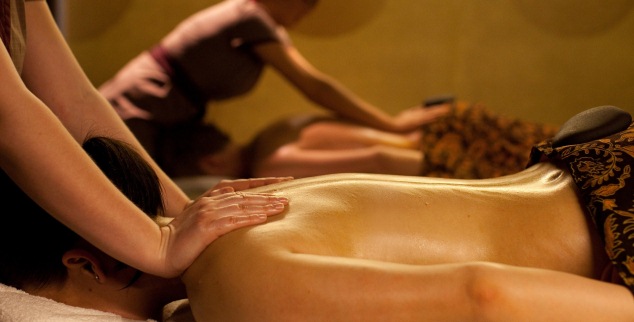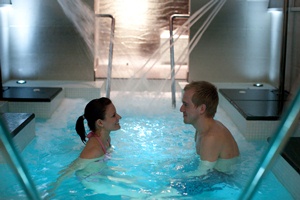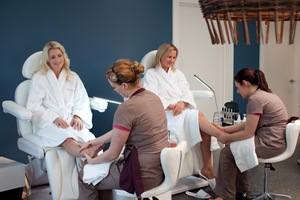0203 397 8891
Open today: 9:00am - 6:00pm
 Sue Davis
Sue Davis
Prior to becoming a naturopath, Sue Davis spent many years working in the corporate environment; this experience helped her gain invaluable insights into the multi-layered health and wellness challenges faced by busy executives. It was Sue's hectic, fast paced and ultimately unhealthy lifestyle in Hong Kong that spurred her on to retrain as a naturopath for four years in Sydney. After a successful number of years helping the elite clientele of the top ranking International Health and Wellness Resort 'Chiva-Som' in Thailand, Sue is now back on her home ground in the UK.
Can you explain what being a naturopath and naturopathy treatment entails?
The naturopathic philosophy is to stimulate the healing power of the body and to treat the root cause of disease. Symptoms of disease are seen as red flags highlighting improper functioning of the body. Naturopathic medicine is the fusion of modern scientific research and the timeless wisdom of nature. It is a profound healing system that encompasses all aspects of health and truly embraces the mind-body-spirit connection. The most basic premise of naturopathy is that the body has the inherent ability to heal itself if given the right tools. These could include dietary and lifestyle correction, the concept of 'food as medicine', herbs, flower essences, nutritional supplements, detoxification and exercise.
What are the most common health benefits after a naturopathy treatment?
Naturopathy is very empowering as much emphasis is placed on education so that the person has the tools to take control of their health. Once someone understands that health doesn't just happen by chance and that it is a life-long process that involves a clear understanding of the factors that affect their health then they are in a much stronger position to achieve long term health and vitality.
Some people have a whole range of symptoms that they have been unable to address on their own or with the help of other medical practitioners. With a broad understanding of the relationship between health, life and the environment naturopaths are often able to offer a new perspective and provide safe and effective ways to restore health. Naturopathic medicine is very effective in improving quality of life for those with serious and life threatening illnesses. It works very well for those patients that are looking to combine conventional and naturopathic treatments with the aim of minimising side effects to drugs and conventional treatments.
What treatments would you recommend for clients who are stressed?
In terms of spa treatments, ESPA personalised massages are a wonderful way to relax. For those requiring something more indulgent then a Hot stone back, face and scalp for the ladies and a Stress buster for the gents are highly recommended. Meditation classes are also a great way to reduce stress, especially as a private session. Other great treatments for stress are Shiatsu massage which works on balancing and releasing energetic blocks from joints and muscles to restore vitality. For those that don't like massage, Reiki is a gentle, healing process performed while fully clothed aimed at restoring balance to mind, body and spirit.

An ESPA personalised massage
What part do herbs play in Naturopathy and how can herbs work in combination with other forms of natural medicine?
Many pharmaceuticals have been formulated by isolating an active constituent in a herb. A great example is aspirin derived from Willow Bark. Nature is very clever and doesn't tend to get things wrong so herbalists traditionally use the whole herb rather than a part. Whole plants are known to synergise and potentise an active ingredient as well as ward off any side effects common in conventional medications.
Herbs are very effective in the initial stages of a naturopathic protocol and can work quickly to help alleviate a condition. Digestive health issues and hormonal imbalances respond very well to herbs. They are prescribed either as liquid blends, tinctures or as herbal teas. Herbs are also great in treatments for stress in conjunction with meditation. Reflexology can help herbs to work more quickly and efficiently and acupuncturists routinely prescribe herbs to balance and heal the body following a treatment.
If you lived on a deserted island for one year, what seven foods would you most want to take with you?
1. The first food would already be there, the humble coconut. So versatile and excellent for good fats, protein and the isotonic properties of the coconut water.
2. Dark chocolate for antioxidants and magnesium and I'm a woman so a no brainer.
3. Quinoa working on the basis it's the only grain that's a carbohydrate and a protein plus it kept the Incas going.
4. Potatoes -surprisingly a good source of vitamin C and excellent for making fat chips
5. Almonds - good for calcium
6. Extra Virgin Olive Oil - good source of omegas and needed for the fat chips
7. Red wine - for antioxidants and to relieve the inevitable boredom
Can you name a few examples of common ailments or problems that can be treated by a naturopath and how?
Digestive health issues respond particularly well to naturopathic intervention. Irritable Bowel Syndrome (IBS) is a common ailment with stress as the root factor. Advice will include practical ways to reduce stress levels including relaxing abdominal breathing techniques, yoga, regular massage and meditation. Inflammation of the digestive tract is often present and this is addressed through 'healing and sealing' of the digestive tract with soothing demulcent herbs such as Slippery Elm and Aloe Vera. Oily fish two to three times a week or fish oil supplementation will be recommended for the Omega 3 anti-inflammatory properties. Food intolerances may be an issue particularly if the integrity of the gut lining is compromised so a finger prick blood test may be performed in the consultation to detect for food antibodies. Probiotics to restore friendly gut bacteria and digestive enzyme supplements for the efficient breakdown of proteins, fats and carbohydrates may be necessary to help the body better assimilate nutrients and build healthier cells. Those with big coffee habits will be cajoled to switch to soothing chamomile and peppermint teas.
As a Naturopath much emphasis is placed on the digestive health as we very much believe 'you are how you digest'. You can have the best diet in the world but if your digestion is compromised you won't reap the full benefits.
Feeling tired all the time (TATT) is another common complaint that responds well to naturopathy. Some initial blood tests may be required from the person's doctor to rule out any thyroid problems or anaemia. Emphasis would again be placed on improving the overall digestive health to promote better energy production. The liver is a governing organ for energy so cleansing herbs, juices and foods such as beetroot, proven to generate nitric oxide and stamina would be prescribed. White refined carbohydrates such as bread, pizzas, baguettes, pasta, potatoes and white rice often form the bulk of a person's daily dietary habits and these can swing blood sugars causing a person to feel extremely tired. To break this cycle each meal would need to include some type of protein together with complex carbohydrates and beneficial fats. B-Complex supplementation would be prescribed as well as my favourite recommendation of supergreens powder which is a powdered blend of wheatgrass, barleygrass, chlorella, nettles, sea greens and other green dried superfoods. Both of these create more energy.


Relaxing in a hydrotherapy pool and receiving a leg massage
Tell us about a client that you most enjoyed helping any why?
My favourite client was a very busy events organiser in his mid 50's based in Hong Kong. He would regularly visit Chiva Som in Thailand for 2 weeks at a time. The first time he arrived he was very overweight, with a poor complexion, bloating, very stressed and completely burn out from flying all over Asia. He didn't have time for exercise, was an insomniac and tended to eat all the wrong things at all the wrong times due to the nature of his job. His blood pressure and cholesterol were very high.
From a practitioner's view point this was damage control at the extreme, however, it is never too late to create positive health changes especially when an individual has identified the need for help and this chap was willing to consider anything if it meant he would look and feel better.
Initially I worked on correcting his poor dietary habits providing him with tips and advice that were practical and achievable for his erratic lifestyle. He undertook a cleansing detox programme at the start of his stay to give his liver some support, normalise his digestion and create some motivational weight loss. Heavy duty exercise is not recommended during a cleanse so this provided the perfect opportunity for him to rest and recharge and normalise his sleeping patterns.
After the detox and for the rest of his stay he ate a balanced daily diet of good quality protein, fruit and vegetables. He exercised with the physiotherapist in the swimming pool in the mornings to protect his joints and back and in the afternoon either did interval training in the gym or went for long brisk walks. This combination proved to be a winner and he had lost 7kg by the time he left. His blood pressure had normalised and blood tests revealed much improved cholesterol levels.
Once home he hired a personal trainer and became more organised with his food, often taking his own snacks on planes or by simply making better choices. We had talked about the 80/20 rule meaning 80% of the time he followed the plan and 20% of the time he could relax and eat anything he fancied. This worked well as it ruled out denial and cravings, the downfall of most diets. Two years later and with regular trips to the resort I was greeted with the question 'Would you like to see my six pack?'
What's the most significant thing you've learnt about your health over the course of your career?
That my body likes routine and if I swerve away from regular good habits then I'll pay for it with poor sleep and lower energy levels.
Why do you think alternative therapies like naturopathy are becoming more popular?
I think there is a general air of disillusionment with the healthcare service and that people are becoming more wary of prescribed pharmaceuticals that often carry unwanted side effects. Articles on natural health are becoming more mainstream in popular magazines and newspapers so people know that they can take Echinacea to ward off a cold or drink more water to cure a headache. If they venture to see a naturopath they are guaranteed at least an hour to focus on themselves rather than the 3 minutes allocated by a time poor GP.
What are your top health, lifestyle and diet tips?
Start each morning with ½ lemon squeezed in warm water to cleanse, alkalise and initiate digestion. Add a thumb size piece of fresh grated ginger to improve circulation and alleviate bloating then stir in a teaspoon of manuka honey to keep the immune system happy.
If you had to recommend one simple lifestyle change we could make, what would it be?
Switch off all technological equipment before going to bed. Electro-smog from technology builds up in our bodies so it is not a good idea to use your mobile phone as alarm. Televisions should be switched off at the plug in bedrooms and Wi-Fi should be off when not in use. You will sleep better for it.
View our Luxury Spa Breaks for further inspiration.
Join our mailing list to receive the latest news, offers & £50 off your first holiday.